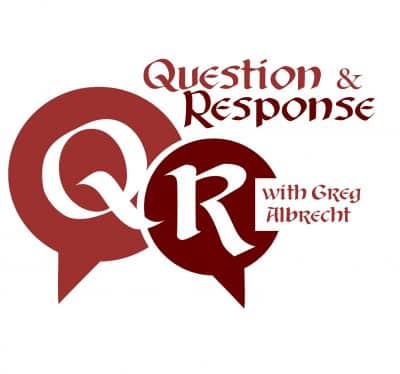Did God the Father Forsake Jesus the Son on the Cross? – Greg Albrecht

Question:
Thanks for all the great resources you provide. I’m trying to reconcile the what seems to Jesus to be a “forsaken-ness” or estrangement/alienation of God and Jesus on the cross. How are we to interpret the cross in light of this? Love you guys.
Response:
My sense of this much debated statement on the cross – “My God, my God, why have you forsaken me?” (Matthew 27:46) – begins with a Christ-centered interpretation, which is the place where I try to start any question about a biblical passage.
- Jesus was and is God – (see John 1:1-3). He was never not divine, and forever will be divine.
- In his humanity Jesus was God incarnate. Something that God, who is Father, Son and Holy Spirit, had never been. God had never been human. God is one, existing eternally in there co-equal, co-eternal and co-essential divine Persons, sharing one essence, one nature, one substance. They were and are and forever will be perfectly “one” – in perfect unity and harmony. Everything that is comes from the Father through the Son and in the Holy Spirit. This is the collective biblical (New Testament) definition of God.
- Given these two biblical conclusions, how can God, eternal, perfect and uncreated become a human – humans are mortal, imperfect and created?
- Early Christians believed, as they were confronted with this question, that God in Christ was “one being” – the word used then, and still is, in theological circles, homoousios. The Godhead of Father, Son and Holy Spirit, is indivisible. Thus, early Christians believed that Jesus was and is very man and very God. In some unique, never before and never again way, Jesus was perfectly and fully divine and perfectly and fully human – the two natures were not comingled, for it is impossible for a human to be divine at the same time… except, uniquely so, in the case of the revelation of God in Christ, the incarnated God, in the person of Jesus.
- Thus, for the Father to “forsake” the Son would be, according to the biblical evidence, impossible.
- What did Jesus mean then when he said that God, the Father, had forsaken him?
- This statement of Jesus on the cross is a direct quotation of Psalm 22:1. Jesus, in his humanity, was expressing abandonment. He was speaking of his human experience of being distanced from God – not of his divinity which of course was then and forever had been one with the Father and the Holy Spirit. No division then or ever. The abandonment was human feeling and emotion, psychological not having to do with the divine logic, and essence, which made being forsaken by the Father and the Holy Spirit impossible. He was, on the cross, experiencing humanity in a way that divinity does not. He was suffering. Did Father God forsake Jesus in his suffering? No, it was part of the profound meaning and significance of the Cross. Jesus of course knew that he was not being “abandoned” in totality, for Jesus knew that he would be resurrected. Jesus is applying a passage in Psalm 22:1 to the specific and existential event he was enduring, including being mocked, beaten and tortured, pierced and having lots cast for his garments. Jesus was also, obviously, fully aware of the totality of Psalm 22, including Ps. 22:24, … “For he has not despised or disdained the suffering of the afflicted one; he has not hidden his face from him but has listened to his cry for help.”








 Plain Truth Ministries | Box 300 | Pasadena, CA 91129-0300
Plain Truth Ministries | Box 300 | Pasadena, CA 91129-0300

